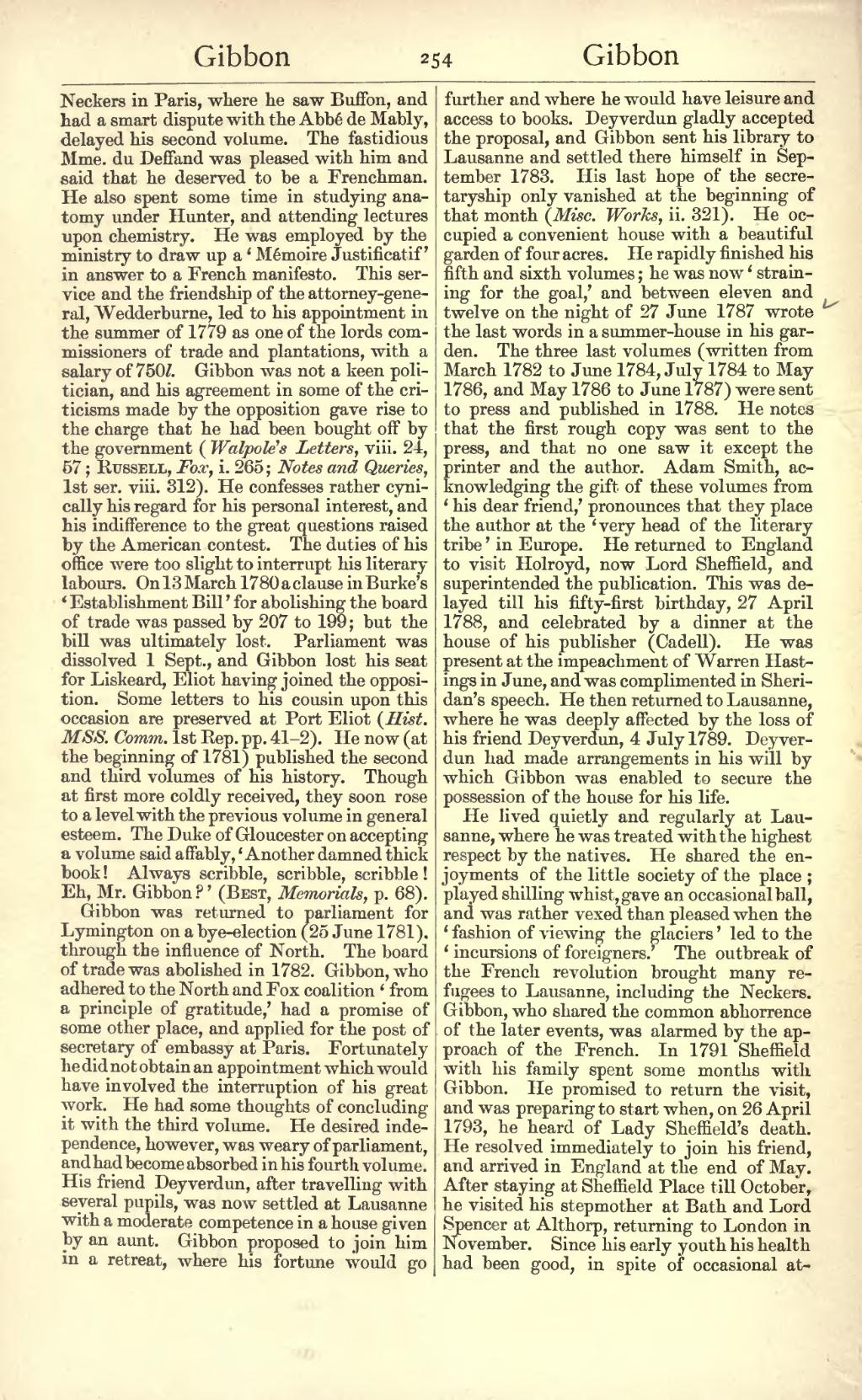Neckers in Paris, where he saw Buffon, and had a smart dispute with the Abbé de Mably, delayed his second volume. The fastidious Mme. du Deffand was pleased with him and said that he deserved to be a Frenchman. He also spent some time in studying anatomy under Hunter, and attending lectures upon chemistry. He was employed by the ministry to draw up a ‘Mémoire Justificatif’ in answer to a French manifesto. This service and the friendship of the attorney-general, Wedderburne, led to his appointment in the summer of 1779 as one of the lords commissioners of trade and plantations, with a salary of 750l. Gibbon was not a keen politician, and his agreement in some of the criticisms made by the opposition gave rise to the charge that he had been bought off by the government (Walpole's Letters, viii. 24, 57; Russell, Fox, i. 265; Notes and Queries, 1st ser. viii. 312). He confesses rather cynically his regard for his personal interest, and his indifference to the great questions raised by the American contest. The duties of his office were too slight to interrupt his literary labours. On 13 March 1780 a clause in Burke's ‘Establishment Bill’ for abolishing the board of trade was passed by 207 to 199; but the bill was ultimately lost. Parliament was dissolved 1 Sept., and Gibbon lost his seat for Liskeard, Eliot having joined the opposition. Some letters to his cousin upon this occasion are preserved at Port Eliot (Hist. MSS. Comm. 1st Rep. pp. 41–2). He now (at the beginning of 1781) published the second and third volumes of his history. Though at first more coldly received, they soon rose to a level with the previous volume in general esteem. The Duke of Gloucester on accepting a volume said affably, ‘Another damned thick book! Always scribble, scribble, scribble! Eh, Mr. Gibbon?’ (Best, Memorials, p. 68).
Gibbon was returned to parliament for Lymington on a bye-election (25 June 1781), through the influence of North. The board of trade was abolished in 1782. Gibbon, who adhered to the North and Fox coalition ‘from a principle of gratitude,’ had a promise of some other place, and applied for the post of secretary of embassy at Paris. Fortunately he did not obtain an appointment which would have involved the interruption of his great work. He had some thoughts of concluding it with the third volume. He desired independence, however, was weary of parliament, and had become absorbed in his fourth volume. His friend Deyverdun, after travelling with several pupils, was now settled at Lausanne with a moderate competence in a house given by an aunt. Gibbon proposed to join him in a retreat, where his fortune would go further and where he would have leisure and access to books. Deyverdun gladly accepted the proposal, and Gibbon sent his library to Lausanne and settled there himself in September 1783. His last hope of the secretaryship only vanished at the beginning of that month (Misc. Works, ii. 321). He occupied a convenient house with a beautiful garden of four acres. He rapidly finished his fifth and sixth volumes; he was now ‘straining for the goal,’ and between eleven and twelve on the night of 27 June 1787 wrote the last words in a summer-house in his garden. The three last volumes (written from March 1782 to June 1784, July 1784 to May 1786, and May 1786 to June 1787) were sent to press and published in 1788. He notes that the first rough copy was sent to the press, and that no one saw it except the printer and the author. Adam Smith, acknowledging the gift of these volumes from ‘his dear friend,’ pronounces that they place the author at the ‘very head of the literary tribe’ in Europe. He returned to England to visit Holroyd, now Lord Sheffield, and superintended the publication. This was delayed till his fifty-first birthday, 27 April 1788, and celebrated by a dinner at the house of his publisher (Cadell). He was present at the impeachment of Warren Hastings in June, and was complimented in Sheridan's speech. He then returned to Lausanne, where he was deeply affected by the loss of his friend Deyverdun, 4 July 1789. Deyverdun had made arrangements in his will by which Gibbon was enabled to secure the possession of the house for his life.
He lived quietly and regularly at Lausanne, where he was treated with the highest respect by the natives. He shared the enjoyments of the little society of the place; played shilling whist, gave an occasional ball, and was rather vexed than pleased when the ‘fashion of viewing the glaciers’ led to the ‘incursions of foreigners.’ The outbreak of the French revolution brought many refuges to Lausanne, including the Neckers. Gibbon, who shared the common abhorrence of the later events, was alarmed by the approach of the French. In 1791 Sheffield with his family spent some months with Gibbon. He promised to return the visit, and was preparing to start when, on 26 April 1793, he heard of Lady Sheffield's death. He resolved immediately to join his friend, and arrived in England at the end of May. After staying at Sheffield Place till October, he visited his stepmother at Bath and Lord Spencer at Althorp, returning to London in November. Since his early youth his health had been good, in spite of occasional at-
